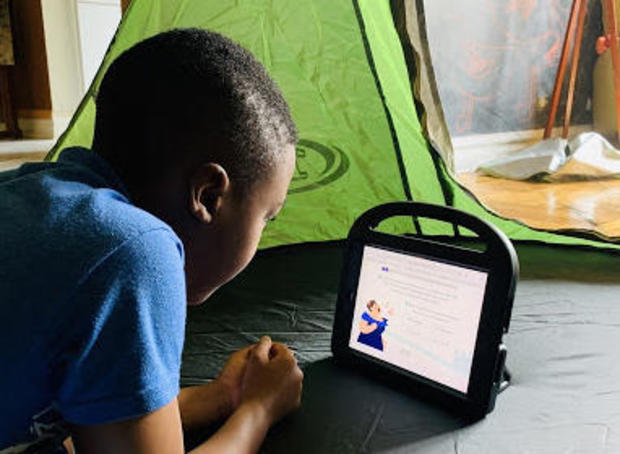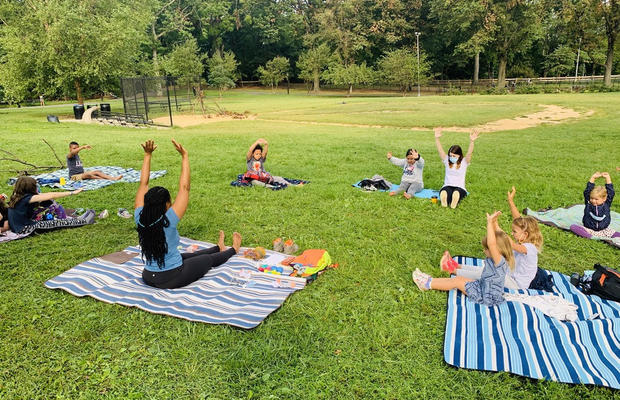Many parents across the U.S. had to adjust to their children learning from home for the first time as a result of the coronavirus pandemic. But a group of working parents in Queens, New York have been doing it since last year. Tiffany Pierce started a homeschooling co-operative for her son in September 2019.
“I created the co-op with my son going into his third-grade year… because it’s hard to homeschool by yourself,” said Pierce, who is an instructional designer. “And so I thought, you know what? If I could create this little micro-community for my son, it would also help other families who want to do this as well and it could meet working parents’ needs.”
The co-ops generally consist of 10 students from varying grade levels, extending from preschool to sixth grade. Before the onset of the coronavirus pandemic, the children met at Pierce’s home to learn together. Licensed teachers come in, including a Mandarin teacher, to help educate the students. Pierce works with the teachers and other parents to conduct lessons, plan learning excursions and create projects for the students.
Pierce has now led five co-ops since she started that one in 2019, at least partly due to growing home-schooling demands brought on by the spread of COVID-19. Pierce says what makes her co-ops unique is that all of the parents have jobs, and come together as a community to ensure their children are looked after and educated while they are at work.
“I feel like there’s a myth out there that only stay-at-home parents can homeschool their children,” Pierce said. “Well, that’s not true. And I proved it because all of my parents work and they have different scenarios [and] scheduling where some work from home, some were going into the office pre-COVID. They might tag-team with a nanny or they might tag-team with a neighbor, or one of my parents tag-teamed with me.”
Dasha Moser and her husband both work jobs that have been deemed essential during the pandemic, so staying at home with their kids was never an option. But they chose to home-school their children in order to be more intimately involved with their education.
“In a home-schooling environment, you know what your child is focusing on every single day,” said Moser, whose 7-year-old and 4-year-old daughters both participate in Pierce’s home-schooling co-op. “You know where their strengths are and where their weaknesses lie. And so you use your time, weekends, afternoons, holidays, days off, vacations, to really help support and sync the knowledge that they’re gaining in their home-schooling environment.
Moser explained that her children are the driving force behind what they learn. They get a say in what specific things they want to learn about each subject, and get to focus on areas they might find more challenging than their peers do.
“The world around you becomes an educational tool where you can move forward any kind of lesson that they receive during the day in a group setting,” Moser said. “And then give individualized attention to your child to help deepen their understanding of a particular subject matter.”
Pierce sits down with all of the parents and their children to discuss the things they want to focus on. She also allows the students to take breaks every 15 minutes.
“You have to keep, especially younger ones, engaged for short amounts of time and you build it up so you can create 45 minutes, so you can create an hour,” Pierce said. “So I do bite-sized learning and I take that from my instructional design background.”
Pierce also uses her instructional design background to optimize digital classes, since 50% of lessons are virtual in order to maintain social distancing.
“There are different considerations over what browser or device you’re using,” said Pierce, who uses Zoom in addition to other programs such as Happy Numbers and i-Excel to help educate the co-op students. “So I familiarized myself with all the devices that are out there, the mainstream ones that my co-opers are using, so I can guide them if they had a question like ‘I don’t see this’ — we get that a lot.”
She also said it’s important to have the children actively engaged by letting them take control of her screen, finding items in their homes that can apply to a read-aloud, and acting out the scenes, among other activities.
The other 50% of learning at the co-op occurs outdoors, where the students wear masks and practice social distancing. Pierce acknowledges that none of this is easy and says different learning styles work for different families. But she also encourages parents to embrace learning from home.
“If you pull from your own childhood or adult experiences, the things that you found really exciting were the things that a lot of the times were hands-on for you,” Pierce said. “You were engaged because you had a project to do or it met your exact interest level. Home-schooling allows you to have that kind of precision and blow it up as big as it can go and stretch it as wide as it can be stretched. You can go so far down a rabbit hole based on an interest level. But the child would have read, done science and history, all within that rabbit hole of learning.”




